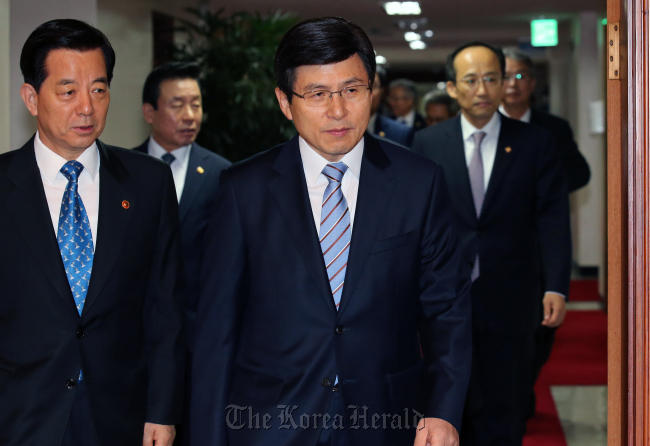Seoul to raise fighter tech transfer despite grim outlook
By Shin Hyon-heePublished : Oct. 14, 2015 - 17:49
Defense Minister Han Min-koo is expected to reiterate his request this week to reconsider Washington’s refusal to transfer technologies essential for Seoul’s fighter jet initiative, officials said Wednesday, despite the murky prospects for a reversal.
Han will meet with his U.S. counterpart Ash Carter while accompanying President Park Geun-hye on her trip to Washington, which includes a stop at the Pentagon.
The Defense Ministry and the state-run Defense Acquisition Program Administration have come under fire after they were found to have failed to secure the handover of core technologies from Lockheed Martin Corp., a Maryland-based defense giant picked to deliver next-generation warplanes, due to the opposition of the U.S. government.
“As Han had made a request to Carter via letter earlier, he will inevitably raise the issue during their talks,” a ministry official said, requesting anonymity due to the sensitivity of the matter.
Prime Minister Hwang Kyo-ahn also said at a parliamentary questioning early in the day that the two countries’ defense officials are in related consultation.
Han will meet with his U.S. counterpart Ash Carter while accompanying President Park Geun-hye on her trip to Washington, which includes a stop at the Pentagon.
The Defense Ministry and the state-run Defense Acquisition Program Administration have come under fire after they were found to have failed to secure the handover of core technologies from Lockheed Martin Corp., a Maryland-based defense giant picked to deliver next-generation warplanes, due to the opposition of the U.S. government.
“As Han had made a request to Carter via letter earlier, he will inevitably raise the issue during their talks,” a ministry official said, requesting anonymity due to the sensitivity of the matter.
Prime Minister Hwang Kyo-ahn also said at a parliamentary questioning early in the day that the two countries’ defense officials are in related consultation.

The four technologies are vital to building integrated systems respectively for an active electronically scanned array radar, electro optical targeting pod, infrared search-and-track and radio frequency jammer.
They are part of the 25 technologies that DAPA agreed last September to acquire from Lockheed, which won a 7.3 trillion won ($6.4 billion) deal to deliver 40 F-35 radar-evading fighters for deployment between 2018 and 2021.
The U.S. denied an export license for the four, citing its technology protection policy, while the decision on the other 21 is forecast to come as early as November.
Despite Han’s appeal, Washington is unlikely to change its decision given the technologies’ sensitivity and sophistication and its record that it has never issued an export license for any of the four.
As an alternative, ministry and DAPA officials have said they will obtain the technologies from other countries and through research and development by the Agency for Defense Development.
Yet with Washington’s rejection, Seoul faces a major hurdle for its 18.1 trillion won project, dubbed KF-X or Boramae, to introduce its own first KF-16-class warplane by 2025 and deploy 120 units by 2032.
Few other countries will be willing to transfer AESA and the overall system integration technologies also in light of future competition in the export market, experts pointed out.
“If we ultimately fail to adopt the four technologies from the U.S., we will consider developing them at home and are pursuing cooperation with a third country,” Hwang said.
“It’s too early to conclude that we cannot do it, say, in 10 years or five years. ... We will try our paces to make it possible, while crafting countermeasures.”
By Shin Hyon-hee (heeshin@heraldcorp.com)



![[Herald Interview] 'Amid aging population, Korea to invite more young professionals from overseas'](http://res.heraldm.com/phpwas/restmb_idxmake.php?idx=644&simg=/content/image/2024/04/24/20240424050844_0.jpg&u=20240424200058)







![[Hello India] Hyundai Motor vows to boost 'clean mobility' in India](http://res.heraldm.com/phpwas/restmb_idxmake.php?idx=644&simg=/content/image/2024/04/25/20240425050672_0.jpg&u=)





![[Today’s K-pop] NewJeans' single teasers release amid intrigue](http://res.heraldm.com/phpwas/restmb_idxmake.php?idx=642&simg=/content/image/2024/04/26/20240426050575_0.jpg&u=)